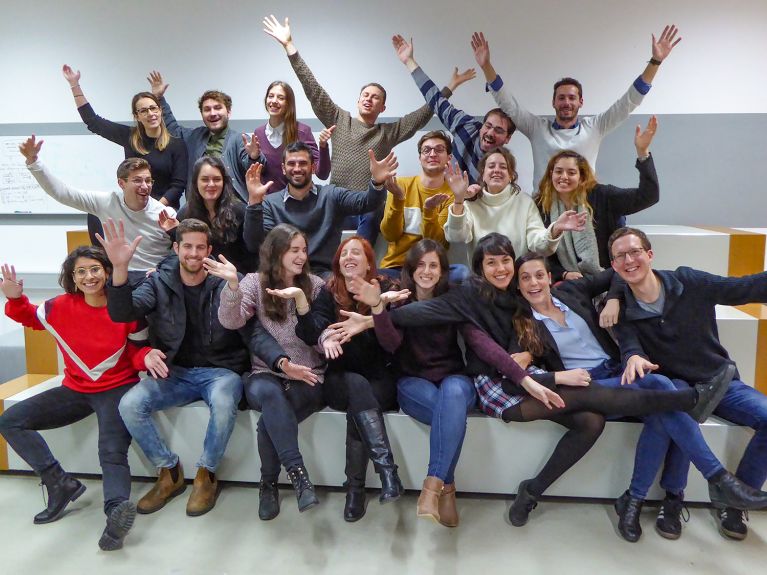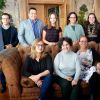Innovation as a team effort
Mixed groups, topical issues, plenty of new ideas: Exchange programme has young Israelis and Germans jointly solve real digitisation challenges.

“After focussing on theory at university I was keen to finally gain some practical experience,” says Hagai Mirkin, who will shortly complete his degree in Psychology and Political Science. In 2019 the student of Ben-Gurion University of the Negev applied for a place on the Bavaria Israel Partnership Accelerator (BIPA) programme and was invited to Munich this spring. What then followed exceeded Mirkin’s expectations: “It is no exaggeration to say that BIPA changed my life.”
Open Innovation as concept
Two countries, four firms, 20 participants and 60 days – that is the key data for the biannual exchange programme between the Bavarian capital of Munich and Be’er Sheva in Israel. The aim is to create closer contacts between young students of all subjects and the German and Israeli high-tech industry. To achieve this, the organisers – Strascheg Center for Entrepreneurship (SCE), the University of Applied Sciences Munich and the Tech and Entrepreneurship-Community Tech7 in Be’er Sheva – pursue a special concept called Open Innovation. This involves “firms drawing on outside input to accelerate processes or develop solutions more quickly and efficiently”, explains BIPA coordinator Tal Soltz from Tech7.
Initially ten candidates from Germany and Israel respectively are selected from the roughly 60 to 80 applicants per nation. “We don’t look so much at academic achievements or best marks,” says Soltz. It is more important that the applicants are open to international dialogue. Moreover, participants must either still be studying or have obtained a degree no more than five years earlier.
The partners: start-ups, medium-sized firms and global market leaders
First of all, the international group meets for a one-week kick-off workshop in Be’er Sheva or Munich, where participants get to know the firms involved, visit their headquarters and talk with CEOs or other executive staff. Each firm presents a specific task or “challenge” in the field of digitisation that the young BIPA team is to help address. In spring 2019 the topic was Digital Health; all the Bavarian firms came from this field of work. Other regular subjects include Smart Mobility or IT Security. “We have had everything from a Munich-based start-up to a successful medium-sized business to large corporations such as Siemens or Audi,” relates German programme coordinator Morten Edzards from SCE. Often the challenge is to develop business models or marketing strategies, and sometimes a new market is to be exploited, a new online tool implemented or a target group addressed more precisely.
Teamwork benefits from diversity
It is by no means a disadvantage that not all BIPA participants have a business background. “On the contrary,” emphasises Edzards. It is precisely the team’s interdisciplinary make-up that produces surprisingly innovative ideas. Which is why when putting the teams together (made up of five participants per task) the organisers pay particular attention to diversity. So you get a medical student alongside an aspiring business engineer, a political science student working with a colleague pursuing African studies and a music student alongside an industrial designer. After the kick-off week the team’s actual work is largely conducted using digital means. Supported by mentors, the groups have to organise themselves for several weeks using Skype, Trello or Google Docs. Initially, the clichés about both countries were born out, says Hagai Mirkin. “Germans are much more organised.” But very quickly this thinking in stereotypes receded into the background. Mirkin’s conclusion: “We are not that different – and where there are cultural differences we complement each other very well.”
Dieses YouTube-Video kann in einem neuen Tab abgespielt werden
YouTube öffnenThird party content
We use YouTube to embed content that may collect data about your activity. Please review the details and accept the service to see this content.
Open consent formProgramme stimulates entrepreneurial spirit
Finally, there is a workshop week – this time in the country where the first workshop was not held. After two months of research it is the chance for the teams to present their findings. “Cooperating with Israeli students and young professionals is hugely beneficial to the firms from Bavaria,” says Edzards. After all, the state may be a strong industrial location, “but it does not have a strong emphasis on internationality. We want to use BIPA to change that.” Every year the participating firms are thrilled at the professional attitude of the young participants and how imaginative their solutions are.
Hagai Mirkin can now imagine working in Germany in the future. “It has become a viable option for me.” Not only because of the insights he had into digital health firms in Munich, but above all because of the friendships that developed within the group. “We are all still keeping in close contact.” Many of the former participants would themselves like to establish their own start-ups later, says Tal Soltz. “BIPA stimulates the entrepreneurial spirit in many people.” Apart from the personal networks created between Germany and Israel, that is the greatest success of the programme.
Applications for the next two-month round of BIPA are expected to able to be submitted from mid-July via the online portal. This time the programme will start in Be’er Sheva and the final presentation will be held in Munich.
You would like to receive regular information about Germany? Subscribe here:



